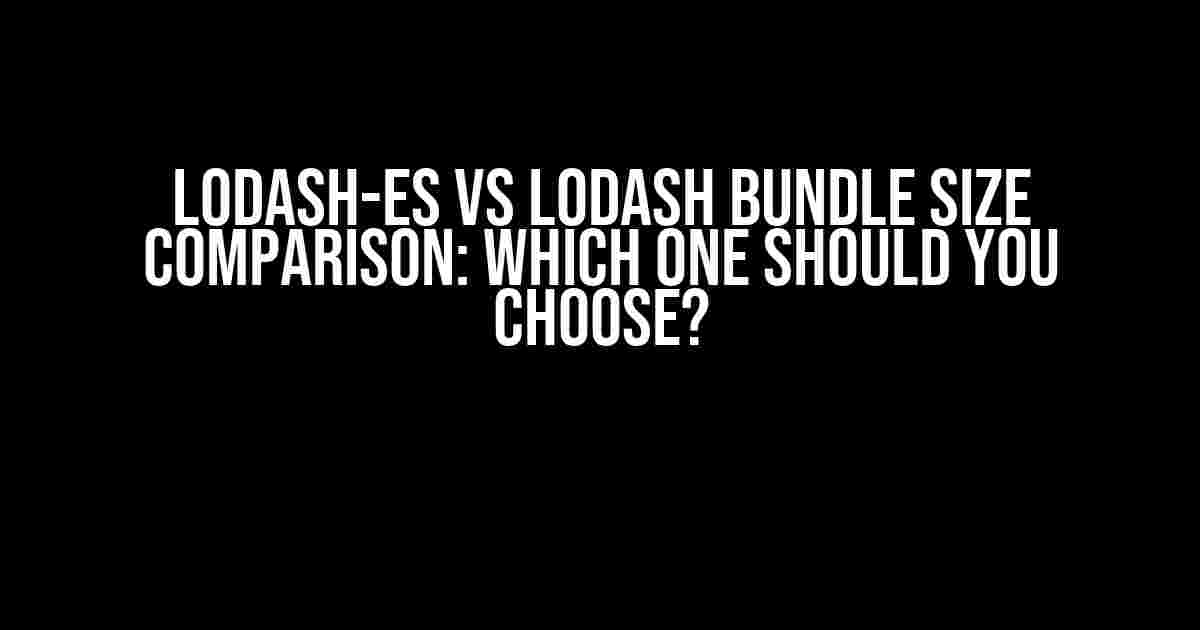Are you a JavaScript developer struggling to decide between Lodash-es and Lodash? Do you want to know which one is better suited for your project? Look no further! In this article, we’ll dive into the world of Lodash and explore the differences between Lodash-es and Lodash, specifically focusing on bundle size comparison.
What is Lodash?
Lodash is a popular JavaScript library that provides utility functions for common programming tasks. It’s often referred to as the “utility belt” of JavaScript, providing over 200 functions for tasks such as array manipulation, object manipulation, string manipulation, and more.
What is Lodash-es?
Lodash-es is a variant of Lodash that’s specifically designed for modern JavaScript environments. It’s a tree-shakeable, ES module version of Lodash, which means it’s optimized for ES6+ syntax and takes advantage of the benefits of ES modules.
Why Compare Bundle Sizes?
Bundle size is a critical factor in modern web development. A smaller bundle size directly impacts the performance of your application, and a larger bundle size can result in slower load times, increased latency, and decreased user experience.
The Impact of Bundle Size on Performance
- Reduced Page Load Times: A smaller bundle size means faster load times, which is essential for providing a seamless user experience.
- Improved Search Engine Optimization (SEO): Search engines like Google prioritize websites with faster load times, making a smaller bundle size a crucial factor in SEO.
- Enhanced User Experience: Faster load times and responsive applications lead to increased user engagement, conversion rates, and overall satisfaction.
Lodash-es vs Lodash Bundle Size Comparison
Now, let’s dive into the bundle size comparison between Lodash-es and Lodash. We’ll explore the different scenarios and environments to give you a comprehensive understanding of which one is better suited for your project.
Scenario 1: Using the Entire Lodash Library
In this scenario, we’ll compare the bundle size of Lodash-es and Lodash when using the entire library.
| Library | Bundle Size (minified and gzipped) |
|---|---|
| Lodash | 64.4 KB |
| Lodash-es | 45.6 KB |
As you can see, Lodash-es has a significantly smaller bundle size compared to Lodash, making it a more attractive option for projects where bundle size is a concern.
Scenario 2: Using a Single Function from Lodash
In this scenario, we’ll compare the bundle size of Lodash-es and Lodash when using a single function from the library, such as `_.debounce()`.
| Library | Bundle Size (minified and gzipped) |
|---|---|
| Lodash | 10.3 KB |
| Lodash-es | 1.3 KB |
Here, Lodash-es has a dramatically smaller bundle size compared to Lodash, making it an excellent choice for projects where you only need a specific function from the library.
Scenario 3: Using Lodash with a Bundler (e.g., Webpack)
In this scenario, we’ll compare the bundle size of Lodash-es and Lodash when using a bundler like Webpack.
| Library | Bundle Size (minified and gzipped) |
|---|---|
| Lodash | 34.2 KB |
| Lodash-es | 23.1 KB |
In this scenario, Lodash-es still has a smaller bundle size compared to Lodash, but the difference is less significant due to the optimization provided by the bundler.
How to Choose Between Lodash-es and Lodash
Now that we’ve compared the bundle sizes of Lodash-es and Lodash, let’s discuss how to choose the right library for your project.
- Modern JavaScript Environment: If you’re working with a modern JavaScript environment that supports ES6+ syntax, choose Lodash-es for its smaller bundle size and tree-shakeable nature.
- Legacy Browser Support: If you need to support older browsers that don’t support ES6+ syntax, choose Lodash for its broader compatibility.
- Specific Function Requirements: If you only need a specific function from Lodash, choose Lodash-es for its smaller bundle size and more granular import options.
- Bundler Optimization: If you’re using a bundler like Webpack, choose Lodash-es for its smaller bundle size and optimization benefits.
Conclusion
In conclusion, Lodash-es is the clear winner when it comes to bundle size comparison. Its smaller bundle size, tree-shakeable nature, and modern JavaScript environment support make it an attractive option for most projects. However, if you need to support older browsers or require specific functionality, Lodash may still be a viable choice.
<script> // Importing the entire Lodash-es library import _ from 'lodash-es'; // Using the debounce function const debouncedFunc = _.debouncefunc, 500); </script>
Remember to consider your project’s specific requirements and choose the library that best fits your needs. Happy coding!
lodash-es vs lodash bundle size comparison
Frequently Asked Question
When it comes to using Lodash in our projects, one of the most common concerns is the bundle size. How do Lodash-es and Lodash bundle sizes compare? Let’s dive in and explore!
What is the main difference between Lodash-es and Lodash in terms of bundle size?
The main difference lies in how they are built and optimized for modern JavaScript. Lodash-es is built as ES modules, which results in a significantly smaller bundle size compared to Lodash, which is built as a CommonJS module. This difference can add up to a whopping 50% reduction in bundle size!
How do I choose between Lodash-es and Lodash for my project?
It’s simple! If you’re working with a modern JavaScript project that supports ES modules, go with Lodash-es for that sweet, sweet bundle size reduction. But if you’re stuck with an older project that uses CommonJS modules, Lodash is still a great choice. Your bundle size might not be as slim, but you’ll still get all the awesome Lodash features!
Will I lose any functionality by using Lodash-es instead of Lodash?
Nope! Lodash-es is simply a different build of Lodash that’s optimized for ES modules. You’ll get all the same functionality, performance, and awesomeness as Lodash, but with a smaller bundle size. You can use Lodash-es as a drop-in replacement for Lodash in most cases.
How do I ensure compatibility with older browsers when using Lodash-es?
If you need to support older browsers that don’t support ES modules, you can use a tool like Webpack or Rollup to transpile and bundle your code. This will ensure that your code is compatible with older browsers, while still allowing you to take advantage of the smaller bundle size offered by Lodash-es.
Are there any other benefits to using Lodash-es besides the smaller bundle size?
Yes! Lodash-es is also more modular and tree-shakeable, which means you can import only the functions you need and reduce your bundle size even further. This makes it a great choice for modern JavaScript projects that prioritize performance and efficiency.



